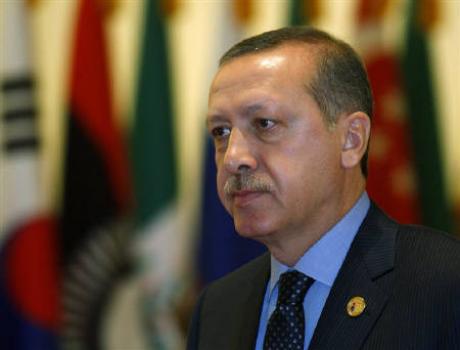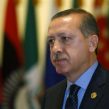
Erdogan Discusses Missile Defense with Obama Ahead of NATO’s Summit in Lisbon
Publication: Eurasia Daily Monitor Volume: 7 Issue: 207
By:

Turkey’s reserved position on the US-led missile shield ahead of NATO’s Lisbon Summit on November 19-20 continues to remain a major issue affecting Turkish-US relations. Since the US values this project as part of its overall policy on the Iranian nuclear program and its agenda of transforming NATO, Turkey’s rather reluctant attitude has raised questions about its commitment to the Alliance and its relations with the United States (EDM, October 21).
There is growing consensus among foreign and domestic observers that pressure has been building on Turkey to clarify its position, especially at a time when most other NATO members (as well as Russia) seemingly adopted a cooperative position. If Turkey still treats NATO as the centerpiece of its defense and security policies, according to the argument, Turkey cannot diverge from its allies at this critical juncture.
Earlier, Turkish officials dismissed any suggestion that Turkey is being pressured to support the project. However, one cannot deny the requirement of acting in concert with its allies, which is increasingly forcing Turkey to make a decision. In preparation for the Lisbon Summit, President Abdullah Gul convened a meeting, bringing together Prime Minister, Recep Tayyip Erdogan, Foreign Minister, Ahmet Davutoglu, and other top officials (Anadolu Ajansi, November 5). Recent statements by Turkish leaders reflect a broad consensus at the apex of the Turkish state, formed through such meetings. Overall, it appears that Turkey is unlikely to yield to pressure, and will perhaps continue to negotiate until the Lisbon summit to have its demands recognized by its allies.
The missile shield also emerged on the agenda during Erdogan’s meeting with President Barack Obama at the G20 Summit in Seoul, where he conveyed Turkey’s sensitivities regarding the project (www.cnnturk.com, November 13). Commenting on his meeting with Obama, Erdogan reiterated Ankara’s position on the missile shield. First, he emphasized that as a NATO member, Turkey would take part in the project provided that it is developed within the NATO umbrella. Second, in Ankara’s view, the plans for the missile shield should not list any country as the potential target. Third, the project should provide protection for the entire Turkish territory as well as other members, underscoring the principle of the indivisibility of security. Moreover, the US needs to offer Turkey clarifications about the location of the system, and the technical details about its deployment and decision-making procedures.
Erdogan also added that Turkey has yet to reach a decision. However, Erdogan underlined that he found the US responsive to Turkish demands for further clarification in the ongoing talks, and the points he listed would constitute the basis of Ankara’s position. At the Lisbon summit, Turkey will be represented by Gul, Davutoglu and Defense Minister, Vecdi Gonul. Depending on whether NATO officials satisfy Turkish concerns, Ankara would make a decision on participation in the program.
During a hearing in the Turkish parliament on the foreign ministry’s budget, Davutoglu, ruled out any pressure on Turkey, yet admitted that NATO is justified to make contingency plans against the threat posed by the proliferation of ballistic missiles. However, Davutoglu made a nuanced point, which he has been reiterating for some time. Davutoglu accepts that as a member of the Alliance, Turkey will act in coordination with its allies, but he emphasized that as an equal partner, or “owner” as he described it, of the Alliance, Turkey wants its voice to be fully heard since decisions in NATO are taken collectively (Anadolu Ajansi, November 12, Hurriyet Daily News, October 30).
In other words, Davutoglu believes that Turkey’s role in NATO is not solely confined to saying “yes” or “no” to a decision already taken; rather it wants to take part in making critical decisions that will affect the future of the Alliance as a whole. Davutoglu rejects the presentation of Turkey as an outlying country that needs to be convinced by the rest of the allies. Rather, Turkey is at the center of Alliance and wants to actively shape its threat perceptions. In that regard, the missile shield debate has a broader meaning for Turkish foreign policy. It provides a major test for the sustainability of Davutoglu’s new foreign policy doctrine that emphasizes independent action and agenda-setting in international affairs.
Likewise, Davutoglu maintains that the US-led missile shield should not undermine Turkish relations with its neighbors. As Erdogan emphasized, Turkey opposes mentioning any country as the target of the anti-ballistic system. Although ballistic missile programs of many countries are cited as posing a risk of proliferation, hence they are used in justifying developing a NATO missile shield, it is no secret that Iran has been viewed as the most immediate source of such a threat. Since Turkey raised reservations about referring to Iran as a potential threat during an earlier NATO ministerial meeting in Brussels last month, there have been signs of acknowledging Ankara’s concerns by US and NATO officials. In an interview, NATO Secretary-General, Anders Fogh Rasmussen, declined to name Iran as a potential threat that the planned missile shield is designed to counter (The New York Times, November 2).
Turkish concern over the impact of the missile shield for relations with its neighbors again shows how another pillar in the new Turkish foreign policy affects Turkey’s thinking on this issue. Turkey has been working to overcome historical rivalries and build friendlier relations with its neighbors, as summarized in the “zero-problems-with-neighbors” doctrine. Turkey is concerned that if the proposed missile shield ends up singling out Iran or Syria, it might compromise its regional policy. Therefore, Davutoglu has been repeatedly arguing that NATO should avoid taking action that might draw new lines of division, making Turkey a “frontier country” as in the Cold War.
Granted, Turkey so far has refrained from categorically rejecting the project, which adds some degree of predictability to its response in Lisbon. Turkey also has laid out its priorities unequivocally, which seem to be appreciated by other NATO members. It will be up to the other Allies to reach a common understanding with Turkey, so that a joint position is adopted in Lisbon.




